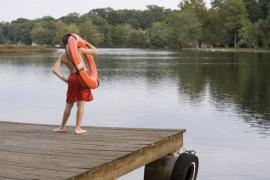"People don't understand. Those three weeks hurt more than any punch in the face could hurt. It took my breath away, and my whole self-confidence." — Will, a camper
Have you ever been bullied — at school, on the playground, at camp? Have you observed others being bullied? Have you ever bullied anyone? Most people have experienced or witnessed bullying some time in their life. Bullying hurts and memories of bullying can often last a lifetime.
The problem of bullying has pervaded our nation's schools and playgrounds — and our camps. Children at camp can be at-risk for suffering from the devastating effects of bullying. Some children may leave camp midway while others may not return the following season because of their experiences with bullying. Campers may suffer from physical, emotional, and social distress both immediately and for years to come. Bullying can directly or indirectly affect every camper. It can undermine their safety, sense of belonging, and feelings of value — all the things that camp should encourage. It impacts their ability to make friends, have fun, and learn new things at camp.
What's Your Role in Bullying Prevention?
Although bullying has been around for a long time, during the last two decades what we know about bullying and how to prevent it has increased enormously. Through research and successful bullying prevention programs, we now know effective skills and strategies to prevent and stop bullying in children's lives.
Creating a bullying-free environment at camp requires that every counselor, staff member, and camper learn and practice the skills and strategies to prevent and stop bullying at camp. What is your role? How can you work with campers and other camp staff to stop and prevent bullying at your camp?
Will's story illustrates how bullying was allowed to escalate at one camp and how it ruined a camper's summer and resulted in long-lasting devastating effects.
Will's Story
"It's so hard to talk about. It brings back so many bad memories." Will explained as he told me his story of how he was relentlessly bullied at an overnight camp for boys that he attended for five summers. It was during the fifth summer everything went wrong. Will had just turned thirteen. I interviewed him five years later, when he was almost 18.
Will's story begins a few weeks into camp when a counselor, after discovering a group of boys playing with a Game Boy, confiscated it — videogames were against camp rules. Matt, Will's bunkmate, quickly blamed Will, even though it was everyone's fault. Suddenly everyone followed Matt's lead and ganged up on Will. They called Will a "thief" and yelled things such as "Where's my hat? I bet Will took it." Will was constantly the target of mean jokes. His bunkmates stopped hanging out with him. His friends were afraid that if they stood up for him, they would become targets. Will became isolated, afraid, and very unhappy.
One of the counselors heard about the situation from some of the campers and tried to be extra nice to Will. But he didn't try to stop the bullying. None of the other counselors did anything. Will said, "They didn't care."
The bullying escalated over a three-week period. Will went from having lots of friends and loving camp activities to losing all his friends, wanting to go home, not wanting to participate in activities, and crying a lot.
He was afraid to tell anyone because he was embarrassed. He thought somehow it was his fault — that he should be able to figure out a way to make the bullying stop. He was afraid to tell his parents because he thought they would look down on him, and think he should be able to handle it. Back home, Will was socially accepted at school; he had never had to deal with a situation like this.
Will explained to me: "There's always a hierarchy in kids' social world. Guys especially mess around and make fun of other guys. But there's a difference between good-humored teasing and real bullying. It's important to see this difference and understand when it becomes bullying." Will continued: "It's my worst nightmare. I'll never forget the feeling of being teased and put down to that extent. It will always stay with me. I will always make sure to stand up for kids who are bullied now, and later in life."
Will concluded the interview with a final reflection: "People don't understand. Those three weeks hurt more than any punch in the face could hurt. It took my breath away, and my whole self-confidence."
Will did not return to that camp the following summer.
What Can We Learn From Will's Story?
Will's devastating experience with bullying at camp cou ld have been prevented. Unfortunately, the key players were not prepared. Will's counselors and bunkmates didn't understand the seriousness of the bullying situation and its effects on Will. They didn't know how to intervene to stop the bullying. In addition, Will's camp had failed to put in place the policies and procedures that could have created an environment where bullying is unacceptable and where everyone takes responsibility for stopping it.
Seven Key Factors That Camps Need to Address
- Bullying hurts. It has devastating short- and long-term effects on children physically and emotionally.
- Bullying escalates quickly, unless camp staff and campers step in to stop it.
- Take bullying seriously. If adults don't, neither will children.
- Don't assume campers will work things out for themselves. Don't ask them or expect them to. Bullying is not an argument or conflict; it's abuse of a power imbalance that usually requires adult intervention.
- Bystanders can play very powerful roles in a bullying situation. During counselor orientation, camper discussions, and activities, it's important to emphasize the role of the bystander. Campers who witness bullying and do nothing can contribute to the problem, or they can make it worse by joining in; campers can prevent or stop the bullying by intervening or getting help.
- Camp staff needs to be prepared to recognize bullying, intervene to stop it, or seek help when they can't.
- It's critical that camps set clear expectations, rules, and policies about respectful behavior and bullying.
Bullying at Camp
Before camps begin each summer, my colleague Ron Slaby, Ph.D., and I are invited to prepare camp staff to stop and prevent bullying at camp. In interactive workshops with counselors and other camp staff and through questionnaires, we learn a lot about the bullying situations that can occur at camp and which campers are most susceptible.
Some campers are socially excluded, targets of teasing and rumors, and physically tormented. Campers may intentionally exclude other campers from activities, dining hall tables, or social groups. Some campers form cliques and exclude other campers. This is especially prevalent and hurtful among girl campers. Sometimes cliques of girls give their group a name, further excluding other campers.
Some campers are burdened with teasing in the form of nicknames derived from their behavior or physical features. For example, at one camp, a junior counselor wanting to hurry along a camper who was slow at changing clothes, called the camper a "Slowpoker." The name stuck and was repeatedly used by campers to taunt the camper.
Lack of supervision during "free time" in cabins, on the playgrounds, or during shower time can lead to bullying. Bullying in the bathrooms includes pouring cold water into showers, locking campers in bathrooms, and making sexually harassing comments.
Younger campers often become victims of older campers, such as when older campers control playground equipment. When preschoolers are part of day camp environments, they sometimes become targets for older campers.
Bullying can occur even before camp begins or after camp has ended for the day or summer. Campers communicate by instant messaging, e-mail, social networking sites, and cell phone, discussing group or bunk selections and devising plans to create cliques or leave others out. Children may gossip about new campers, spread rumors about a campmate, or post inappropriate and hurtful content about a camper on the Internet. These behaviors, called cyberbullying, can result in exclusion, damage a camper's reputation, and ruin friendships.
Which Campers Are Most Susceptible to Bullying at Camp?
New campers, campers who may not perform well, and campers who struggle to make friends or appear different from others are particularly vulnerable to becoming victims of bullying. Campers who are bullied are often quiet, shy, have few or no friends, and have trouble fitting in.
Campers who are not good at sports can be especially targeted. They may be humiliated by always being picked last for the team or they may be taunted or even physically harassed during sports events. Some camps report that children are repeatedly teased because of their designated swimming level. This form of bullying became a particular problem at one camp that required children to wear color coded bracelets that indicated their swimming level.
Campers who are perceived by other campers as awkward or "weird" are often targets of bullying. Campers with special needs, such as children with Asperger Syndrome, may be especially likely to be bullied. Many counselors report that children who are overweight are singled out, teased, and excluded. Some campers are taunted for being gay. Other campers become targets if they are late (or early) in reaching puberty. Some campers are taunted for the type of clothes they wear. And we often hear from counselors who remember when they were bullied as campers for "no reason at all."
Bullying Among Counselors
During our workshops and from questionnaires, we also learned about bullying among counselors, especially younger ones. Gossiping and exclusion is very prevalent among counselors. Some CITs report that they are talked about behind their backs and repeatedly picked on. Camps that recruit foreign students as counselors report that these counselors may be excluded or bullied based on their cultural and language differences, and lack of experience with camp culture. One camp reported bullying in the form of sex ua l ha ra ssment by older ma le counselors against younger female counselors. In addition, counselors can also be involved in cyberbullying. One counselor reported that off season her co-counselor was repeatedly "bashed" in a thread of online comments.
What Is Bullying?
It's difficult to stop bullying if you don't know what to look for. Many behaviors that seem harmless, such as teasing or excluding, can escalate into bullying. Look out for these behaviors, and help campers look out for these behaviors, too, so that everyone can prevent bullying before it happens.
Bullying is a form of emotional or physical abuse that has three defining characteristics:
- Deliberate — a bully's intention is to hurt someone
- Repeated — a bully often targets the same victim again and again
- Power imbalanced — a bully chooses victims he or she perceives as vulnerable (K. Storey, et al., 2008, p. 4)
Look Out for the Warning Signs
To be able to stop bullying, it's also important to look out for warning signs that campers might show. These include:
- Unexplained damage or loss of clothing and other items
- Evidence of physical abuse (bruises and scratches)
- Loss of friends; changes in friends; lack of friends
- Reluctance to participate in activities
- Unusually sad, moody, anxious, lonely, or depressed
- Problems with eating or sleeping
- Headaches, stomachaches, other physical complaints
- Thoughts of suicide or revenge
Look Out for Vulnerable Campers and Potential Bullying Situations
If you k now who is most at risk for bullying, you can look out for the most vulnerable. If you know situations or locations where bullying may occur, you can develop action plans for prevention. For example, adding supervision during free time or in bathrooms, assigning sports teams and dining tables, and keeping swimming abilities more conf idential may prevent bullying from happening in the first place. Understanding campers (and counselors) with special needs (their requirements, abilities, and limitations), and helping campers understand, too, helps increase sensitivity and prevent bullying. To prevent older children from picking on younger children or experienced campers from taking advantage of new campers, ask older or more experienced campers to help out younger or new campers.
Contributing to Your Camp's Bullying-Free Environment
Creating positive relationships is one of the keys to bullying prevention. Bullying is less likely to occur at camp if campers and counselors feel closely connected and responsible for one another. When campers develop positive relationships, they feel comfortable voicing their concerns and seeking help when bullying incidents occur.
It's also important for counselors to examine their own bullying behaviors. Counselors' actions toward each other, and toward campers, can either set the tone for respectful, inclusive relationships or can contribute to an environment where bullying is likely to occur. When you engage in respectful behavior, you become a good role model for your campers.
Some children who attend camp are bullies in their school or community. If at camp you set the right tone and create a positive and respectful environment, children who bully have a chance to change their behavior at camp and engage in more positive interactions with their peers.
You should also set time aside to talk privately with children who may be targets of bullying or who may be participating in bullying. Counselors should meet regularly with directors to report and discuss bullying-related issues that arise.
There are a variety of ways to directly engage children in bullying prevention. During cabin or group meetings, include campers in the process of creating rules that promote respect and prevent bullying. Ask campers to post their rules in cabins, common areas, and the dining hall for all to see and discuss.
Cabin chats, all-camp meetings, and campfire talks are ideal situations for campers and counselors to discuss concerns about bullying and engage in bullying-prevention activities. A good way to begin is to ask counselors first and then campers to share their own stories about bullying, being careful to protect the identity and privacy of those being discussed. Talking about these experiences lets counselors and campers know that bullying affects everyone, and they are not alone. Sharing stories initiates important communication among camp staff and campers. It provides an opportunity to talk about the importance of reporting bullying, and what can be done to stop and prevent it.
Stories are also valuable for learning different options for responding to bullying situations. Tell a story about a bullying situation at camp and ask campers to consider how the victim or the bystanders could intervene to affect the outcome. Through this activity, campers can see new options, appreciate how their actions can make a difference, and become empowered to stand up against bullying that may occur. Camp activities such as drama are also great opportunities for using role-playing activities to help campers practice bullyingprevention skills.
Commitment to a Bullying-Free Camp
Successful bullying prevention requires education, preparation, and teamwork. At camp it's important to provide regular, ongoing opportunities for learning and communicating about bullying prevention. Every camper and counselor deserves to be treated with respect and to feel safe, included, and valued. Only through a committed effort by everyone can camps ensure that every camper and counselor has a bullying-free experience at camp.
What YOU Can Do to Prevent and Stop Bullying
Need More Help?
The Eyes on Bullying multimedia program can help prepare camp staff and campers to stop and prevent bullying. The program provides specific insights, strategies, activities, and resources to address bullying. Visit Eyes on Bullying at www.eyesonbullying.org.
Reference
K. Storey, R. Slaby, M. Adler, J. Minotti, and R. Katz. (2008). Eyes on Bullying: A toolkit to prevent bullying in children's lives. Retrieved from www.eyesonbullying.org/pdfs/toolkit.pdf
Kim Storey, Ed.D., is the co-author and designer of Eyes on Bullying. Some of the information in this article was excerpted or adapted from Eyes on Bullying, which was developed at Educational Development Center, Inc. and funded by the IBM Global Work/ Life Fund, © 2008 Education Development Center, Inc. Dr. Storey has helped camps use the Eyes on Bullying program to engage camp staff in successful bullying prevention. She is a consultant for education, media, and technology projects for and about children and has developed and produced children's television programs, Web sites, and a variety of educational materials. She frequently serves as a featured speaker and provides workshops on bullying and violence prevention and the healthy development of children. For more information, visit www.KimStorey.net or e-mail the author at [email protected].
Originally published in the 2010 May/June issue of Camping Magazine.



